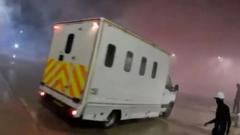Who Are the Six New Defendants in the Palestine Action Break-In Case?

This article examines the recent court proceedings involving six individuals charged with break-ins linked to the controversial campaign group Palestine Action, now proscribed under UK terrorism legislation. The group is accused of significant criminal activity against Elbit Systems, an Israeli defence contractor, with the alleged offences contributing to the Home Secretary's decision to ban the group.
Last updated: 12 October 2023 (BST)
Key Takeaways
- Six defendants face charges related to a break-in at Elbit Systems in August 2024.
- The recent prosecution is tied to Palestine Action, banned as a terrorist organisation in July 2023.
- The alleged break-in resulted in over £1 million in damages.
- A plea hearing is scheduled for 12 December 2023, with further trials planned into 2027.
- Global human rights group Amnesty International is campaigning against the ban and related prosecutions.
Background on Palestine Action and the Ban
Palestine Action is a campaign group that has gained notoriety for its direct action protests against companies involved in arms manufacturing, particularly those linked to Israel. On 5 July 2023, the UK government classified Palestine Action as a terrorist organisation, a significant move that allows law enforcement to target its supporters more aggressively.
The ban was prompted by a series of actions, including a high-profile break-in at Elbit Systems, which has multiple facilities in the UK. This incident has raised questions about the balance between protest rights and national security, as well as the implications of classifying a protest group in such a manner.
The August 2024 Break-in at Elbit Systems
On 15 August 2024, six individuals allegedly participated in a break-in at Elbit Systems' facility in Bristol, reportedly using sledgehammers to cause extensive damage. Prosecutors claim that the actions of the defendants were not only criminal but also had connections to terrorism, according to the UK's Counter Terrorism Policing South East.
The individuals charged include Louie Adams, Harland Archer, Finn Collins, Moiz Ibrahim, Salaam Mahmood, and Liam Mullany. They are jointly accused alongside 18 other defendants, all facing charges of aggravated burglary, criminal damage exceeding £1 million, and violent disorder.
Legal Proceedings and Future Trials
The recent court appearance of the six defendants at the Old Bailey resulted in their remand in custody. They are scheduled to return for a plea hearing at Woolwich Crown Court on 12 December 2023. The first 18 defendants in the case have pleaded not guilty and are at various stages of preparing for their trials, which begin in November 2023.
Mrs Justice Cheema-Grubb noted the logistical challenges of conducting trials with multiple co-defendants in custody, indicating that the earliest possible date for a fourth trial, involving the latest six defendants, could extend to 2027. However, the court is reportedly looking for ways to expedite proceedings.
Public Reaction and Protests
As the case unfolds, public sentiment has been mixed. A group of protesters gathered outside the Old Bailey during the recent court hearing, reflecting the contentious nature of both the charges and the broader implications of banning Palestine Action. Many supporters argue that the group's actions are a form of legitimate protest against military actions and human rights abuses.
In response to the UK government's ban, Amnesty International has initiated an "urgent action" campaign, urging supporters globally to lobby the British government. This campaign specifically focuses on the trials of individuals accused of supporting Palestine Action through peaceful protests, with Amnesty claiming that this is the first time it has targeted the UK in such a manner.
The Impact of the Ban on Civil Liberties
The classification of Palestine Action as a terrorist organisation has raised serious concerns regarding civil liberties and the right to protest in the UK. Critics argue that the government's actions may deter legitimate forms of dissent and activism, potentially criminalising peaceful protest movements. The implications of this ban extend beyond Palestine Action, affecting how other campaign groups may operate in the future.
Home Secretary Yvette Cooper has defended the ban, asserting that some supporters may not fully understand the group's nature, stating it is “not a non-violent organisation.” This position has sparked debate about the government's role in determining what constitutes acceptable forms of protest and dissent.
Amnesty International's Urgent Action
Amnesty International’s unprecedented call for urgent action against the UK government reflects a growing concern over human rights violations associated with the crackdown on Palestine Action. The group argues that the legal actions against individuals involved in peaceful protests are disproportionate and threaten the fundamental right to free expression.
This campaign is unique, as it marks the first time Amnesty has taken such an action against the UK government, traditionally reserving such measures for regimes known for severe human rights abuses. The organisation has called for the British government to abandon trials of up to 700 individuals accused of supporting Palestine Action, which they describe as a chilling effect on civil liberties.
Conclusion
The ongoing legal proceedings surrounding Palestine Action and the individuals charged with break-ins at Elbit Systems highlight a significant intersection of national security, protest rights, and civil liberties. As the trials approach, the implications of the government's ban and the broader context of public dissent will continue to be scrutinised. How the UK government navigates these complex issues could set a precedent for future activism and protest movements.
As we await the outcome of the upcoming court hearings and the public response, the situation remains fluid and charged with implications for human rights advocacy in the UK. How will the balance between security and civil liberties evolve in response to these events? #PalestineAction #CivilLiberties #HumanRights
FAQs
What charges are the six defendants facing?
The six defendants are charged with aggravated burglary, criminal damage exceeding £1 million, and violent disorder in connection with the alleged break-in at Elbit Systems.
What was the government's reason for banning Palestine Action?
The UK government banned Palestine Action citing concerns about the group's activities, which they deemed not to be non-violent and potentially linked to terrorist actions.
What is Amnesty International's stance on the recent prosecutions?
Amnesty International has launched an urgent action campaign against the UK government, urging them to abandon trials of individuals accused of supporting Palestine Action through peaceful protests.
When is the next court hearing for the defendants?
The next court hearing for the six defendants is scheduled for 12 December 2023 at Woolwich Crown Court for a plea hearing.
How has the public reacted to the ban on Palestine Action?
Public reaction has been mixed, with protests occurring outside the courts, reflecting both support for and opposition to Palestine Action and the government's actions against the group.
Published: 2025-08-22 17:14:20 | Category: technology



